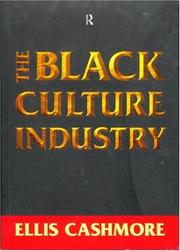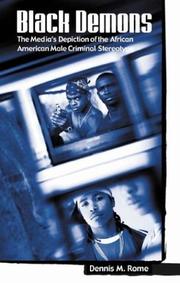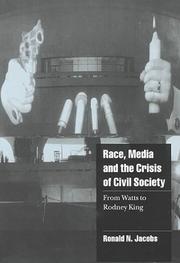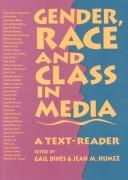| Listing 1 - 10 of 12 | << page >> |
Sort by
|

ISBN: 1134809387 1280463163 0203132041 9786610463169 9780203132043 9780415120821 0415120829 9780415120838 0415120837 0415120829 0415120837 9781134809332 9781134809370 9781134809387 1134809379 9781280463167 Year: 1997 Publisher: London ; New York : Routledge,
Abstract | Keywords | Export | Availability | Bookmark
 Loading...
Loading...Choose an application
- Reference Manager
- EndNote
- RefWorks (Direct export to RefWorks)
This insightful study of the relationship between black culture, wealth, & race relations in the U.S. allows the reader to understand the nature & evolution of race relations in the U.S., and how culture & art can be utilized by wealthy interests.
African Americans --- Racism --- African American arts. --- African Americans in mass media. --- Afro-Americans in mass media --- Mass media --- Afro-American arts --- Arts, African American --- Negro arts --- Ethnic arts --- Negritude --- Race identity. --- History --- Ethnic identity --- United States --- Race relations. --- Race question
Book
ISBN: 1780938578 1780931492 1780931484 1283706075 Year: 2012 Publisher: London ; New York : Bloomsbury Academic,
Abstract | Keywords | Export | Availability | Bookmark
 Loading...
Loading...Choose an application
- Reference Manager
- EndNote
- RefWorks (Direct export to RefWorks)
Beyond Black is Ellis Cashmore's compelling appraisal of the impact of black celebrities on the cultural landscape of contemporary America. In recent years a new variety of African American celebrity has emerged: acquisitive, ambitious, flamboyantly successful and individualistic - more interested in channelling their energy into career development than into the political struggles that animated some of their predecessors. Bill Cosby and Oprah Winfrey were early examples; current A-listers include Beyoncé and Tiger Woods. The most valuable product these celebrities sell, according to Cashmore,
African American celebrities. --- Obama, Barack. --- Post-racialism -- United States. --- Racism -- United States -- History. --- United States -- Race relations. --- Regions & Countries - Americas --- Journalism & Communications --- History & Archaeology --- United States - General --- Communication & Mass Media --- Celebrities in mass media --- African Americans in mass media --- Racism. --- Bias, Racial --- Race bias --- Race prejudice --- Racial bias --- Prejudices --- Anti-racism --- Race relations --- Afro-Americans in mass media --- Mass media --- Critical race theory
Book
ISBN: 1469643405 1469643413 9781469643403 9781469643410 9781469643380 1469643383 9781469643397 1469643391 9798890848758 9798890848741 Year: 2018 Publisher: Chapel Hill : Baltimore, Md. : University of North Carolina Press, Project MUSE,
Abstract | Keywords | Export | Availability | Bookmark
 Loading...
Loading...Choose an application
- Reference Manager
- EndNote
- RefWorks (Direct export to RefWorks)
During its golden years, the 20th-century black press was a tool of black men's leadership, public voice, and gender and identity formation. Those at the helm of black newspapers used their platforms to wage a fight for racial justice and black manhood. In a story that stretches from the turn of the 20th century to the rise of the Black Power Movement, D'Weston Haywood argues that black people's ideas, rhetoric, and protest strategies for racial advancement grew out of the quest for manhood led by black newspapers. This history departs from standard narratives of black protest, black men, and the black press by positioning newspapers at the intersections of gender, ideology, race, class, identity, urbanization, the public sphere, and black institutional life.
African Americans --- Men in mass media --- African Americans in mass media --- African American newspapers --- Afro-American newspapers --- Negro newspapers (American) --- African American press --- American newspapers --- Afro-Americans in mass media --- Mass media --- Civil rights --- History --- Political activity. --- Sociology of minorities --- anno 1900-1999 --- United States --- United States of America --- Race --- Gender --- Newspapers --- Literature --- Masculinity --- Media --- Racism --- Blackness --- Book --- Intersectionality --- Empowerment
Book
ISBN: 0252052277 0252085302 0252043391 9780252052279 9780252043390 9780252085307 Year: 2020 Publisher: Urbana ; Chicago ; Springfield : University of Illinois Press,
Abstract | Keywords | Export | Availability | Bookmark
 Loading...
Loading...Choose an application
- Reference Manager
- EndNote
- RefWorks (Direct export to RefWorks)
By subverting comedy's rules and expectations, African American satire promotes social justice by connecting laughter with ethical beliefs in a revolutionary way. Danielle Fuentes Morgan ventures from Suzan-Lori Parks to Leslie Jones and Dave Chappelle to Get Out and Atlanta to examine the satirical treatment of race and racialization across today's African American culture.
African Americans in mass media. --- American literature --- Satire, American --- Literature and mental illness --- African Americans --- African Americans in popular culture. --- African American authors --- History and criticism. --- History --- Race identity. --- Intellectual life. --- African American intellectuals --- Afro-Americans in popular culture --- Popular culture --- Negritude --- Authors, Insane --- Mental illness and literature --- Poets, Insane --- Afro-Americans in mass media --- Mass media --- Ethnic identity

ISBN: 0275972445 Year: 2004 Volume: *1 Publisher: Westport London Praeger
Abstract | Keywords | Export | Availability | Bookmark
 Loading...
Loading...Choose an application
- Reference Manager
- EndNote
- RefWorks (Direct export to RefWorks)
African Americans in mass media --- Afro-Amerikanen in de massamedia --- Afro-américains dans les mass media --- Crime dans la communication de masse --- Crime in mass media --- Misdaad in de massamedia --- #SBIB:309H1024 --- #SBIB:309H521 --- #SBIB:309H525 --- Mediaboodschappen met een ideologische en spiegelfunctie (beeld vrouw, migranten …) --- Audiovisuele communicatie: inhoudsanalyse: onderzoekingen --- Sociologie van de audiovisuele boodschap --- Mass media --- United States --- Crime and criminals in mass media --- Afro-Americans in mass media
Book
ISBN: 1469602962 0807878022 9780807878026 9781469602967 9780807834626 0807834629 9780807871843 0807871842 9798890840004 9798893130003 Year: 2011 Publisher: Chapel Hill : University of North Carolina Press,
Abstract | Keywords | Export | Availability | Bookmark
 Loading...
Loading...Choose an application
- Reference Manager
- EndNote
- RefWorks (Direct export to RefWorks)
This collection of thirteen essays, edited by historian W. Fitzhugh Brundage, brings together original work from sixteen distinguished scholars in various disciplines, ranging from theater and literature to history and music, to address the complex roles of black performers, entrepreneurs, and consumers in American mass culture during the early twentieth century. Moving beyond the familiar territory of blackface and minstrelsy, these essays present a fresh look at the history of African Americans and mass culture. With subjects ranging from representations of race in sheet music illus
African Americans --- Mass media --- African Americans in popular culture. --- African Americans in mass media. --- Afro-Americans --- Black Americans --- Colored people (United States) --- Negroes --- Africans --- Ethnology --- Blacks --- Afro-Americans in popular culture --- Popular culture --- Afro-Americans in mass media --- Race identity --- History. --- African Americans in mass media --- Noirs américains dans les médias --- Noirs américains dans la culture populaire --- Médias --- Noirs américains --- History --- Histoire --- Identité ethnique --- United States --- Etats-Unis --- Ethnic relations --- Relations interethniques --- Black people
Book
ISBN: 1617039977 1626740283 9781617039980 1617039985 9781626740280 9781617039973 9781617039973 Year: 2014 Publisher: Jackson : University Press of Mississippi,
Abstract | Keywords | Export | Availability | Bookmark
 Loading...
Loading...Choose an application
- Reference Manager
- EndNote
- RefWorks (Direct export to RefWorks)
"From 30 Americans to Angry White Boy, from Bamboozled to The Boondocks, from Chappelle's Show to The Colored Museum, this collection of twenty-one essays takes an interdisciplinary look at the flowering of satire and its influence in defining new roles in black identity. As a mode of expression for a generation of writers, comedians, cartoonists, musicians, filmmakers, and visual/conceptual artists, satire enables collective questioning of many of the fundamental presumptions about black identity in the wake of the civil rights movement. Whether taking place in popular and controversial television shows, in a provocative series of short internet films, in prize-winning novels and plays, in comic strips, or in conceptual hip hop albums, this satirical impulse has found a receptive audience both within and outside the black community. Such works have been variously called "post-black," "post-soul," and examples of a "New Black Aesthetic." Whatever the label, this collection bears witness to a noteworthy shift regarding the ways in which African American satirists feel constrained by conventional obligations when treating issues of racial identity, historical memory, and material representation of blackness. Among the artists examined in this collection are Paul Beatty, Dave Chappelle, Trey Ellis, Percival Everett, Donald Glover (a.k.a. Childish Gambino), Spike Lee, Aaron McGruder, Lynn Nottage, ZZ Packer, Suzan Lori-Parks, Mickalene Thomas, Touré, Kara Walker, and George C. Wolfe. The essays intentionally seek out interconnections among various forms of artistic expression. Contributors look at the ways in which contemporary African American satire engages in a broad ranging critique that exposes fraudulent, outdated, absurd, or otherwise damaging mindsets and behaviors both within and outside the African American community"--
African Americans in mass media. --- African Americans --- Satire, American --- African Americans in literature. --- African Americans in motion pictures. --- African Americans in popular culture. --- Race identity. --- History and criticism. --- Intellectual life. --- African American intellectuals --- Afro-Americans in popular culture --- Popular culture --- Afro-Americans in motion pictures --- Negroes in moving-pictures --- Motion pictures --- Race films --- Afro-Americans in literature --- Negroes in literature --- Negritude --- Afro-Americans in mass media --- Mass media --- Ethnic identity

ISBN: 9780511489211 9780521623605 9780521625784 0511011202 9780511011207 0511489218 9780511050633 0511050631 0511152256 9780511152252 1280418923 9781280418921 052162360X 0521625785 1107115043 0511324944 0511173245 Year: 2000 Publisher: Cambridge : Cambridge University Press,
Abstract | Keywords | Export | Availability | Bookmark
 Loading...
Loading...Choose an application
- Reference Manager
- EndNote
- RefWorks (Direct export to RefWorks)
Since the early nineteenth century, African-Americans have turned to black newspapers to monitor the mainstream media and to develop alternative interpretations of public events. Ronald Jacobs tells the stories of these newspapers, showing how they increased black visibility within white civil society and helped to form separate black public spheres in New York, Chicago and Los Angeles. Comparing African-American and 'mainstream' media coverage of some of the most memorable racial crises of the last forty years such as the Watts riot, the beating of Rodney King, the Los Angeles uprisings and the O. J. Simpson trial, Jacobs shows why a strong African-American press is still needed today. Race, Media and the Crisis of Civil Society challenges us to rethink our common understandings of communication, solidarity and democracy. Its engaging style and thorough scholarship will ensure its appeal to students, academics and the general reader interested in the mass media, race and politics.
African American press --- African Americans and mass media --- African Americans in mass media --- Mass media and race relations --- Mass media --- #SBIB:012.AANKOOP --- #SBIB:309H1024 --- #SBIB:309H1821 --- #SBIB:309H512 --- Social aspects --- Mediaboodschappen met een ideologische en spiegelfunctie (beeld vrouw, migranten …) --- Persartikels: functies, genres, taalgebruik, historiek --- Verbale communicatie: inhoudsanalyse: onderzoekingen --- United States --- Race relations. --- Afro-Americans and mass media --- Mass media and African Americans --- African American journalism --- Afro-American press --- Journalism, African American --- Negro press --- Press, African American --- African American mass media --- Ethnic press --- Afro-Americans in mass media --- Race question --- African American press. --- African Americans and mass media. --- African Americans in mass media. --- Social Sciences --- Sociology
Book
ISBN: 9780813565156 9780813565132 9780813575254 0813565138 0813565154 Year: 2015 Publisher: New Brunswick, N.J. Rutgers University Press
Abstract | Keywords | Export | Availability | Bookmark
 Loading...
Loading...Choose an application
- Reference Manager
- EndNote
- RefWorks (Direct export to RefWorks)
What meaning does the American public attach to images of key black political, social, and cultural figures? Considering photography's role as a means of documenting historical progress, what is the representational currency of these images? How do racial icons "signify"? Nicole R. Fleetwood's answers to these questions will change the way you think about the next photograph that you see depicting a racial event, black celebrity, or public figure. In On Racial Icons, Fleetwood focuses a sustained look on photography in documenting black public life, exploring the ways in which iconic images function as celebrations of national and racial progress at times or as a gauge of collective racial wounds in moments of crisis. Offering an overview of photography's ability to capture shifting race relations, Fleetwood spotlights in each chapter a different set of iconic images in key sectors of public life. She considers flash points of racialized violence in photographs of Trayvon Martin and Emmett Till; the political, aesthetic, and cultural shifts marked by the rise of pop stars such as Diana Ross; and the power and precarity of such black sports icons as Serena Williams and LeBron James; and she does not miss Barack Obama and his family along the way. On Racial Icons is an eye-opener in every sense of the phrase. Images from the book. (http://rutgerspress.rutgers.edu/pages/Fleetwood.aspx)
Sociology of minorities --- Iconography --- Photography --- visual culture --- United States --- Visual communication --- Mass media --- Art and race. --- African Americans --- Blacks --- African American celebrities. --- African Americans in mass media. --- Black identity --- Blackness (Race identity) --- Negritude --- Race identity of blacks --- Racial identity of blacks --- Ethnicity --- Race awareness --- Race and art --- Ethnopsychology --- Graphic communication --- Imaginal communication --- Pictorial communication --- Communication --- Afro-Americans in mass media --- Celebrities, African American --- Celebrities --- Social aspects --- Social conditions --- Race identity. --- Ethnic identity --- Since 1975 --- Race relations. --- Race question --- Race identity of Black people --- Racial identity of Black people --- Black persons --- Negroes --- Ethnology --- Black people --- Black Lives Matter, Trayvon Martin, Barack Obama, Diana Ross, Serena James, LeBron James, Emmet Till, Black Madonna, Janel Monea, Paul Robeson, Malcom X, Martin Luther King Jr, Michelle Obama, Sasha, Malia, Frederick Douglass, Harry Langdon, Motown, Black Panthers, Angela Davis, Lena Horne, Josephine Baker, Billie Holiday, Michael Jackson, Jackson 5, Bessie Smith, Bob Marley, Nelson Mandela:Michael Jordan. --- United States of America

ISBN: 0803951647 0803951639 9780803951648 9780803951631 Year: 1995 Publisher: Thousand Oaks (Calif.): Sage,
Abstract | Keywords | Export | Availability | Bookmark
 Loading...
Loading...Choose an application
- Reference Manager
- EndNote
- RefWorks (Direct export to RefWorks)
rassendiscriminatie --- sociale klassen --- advertenties --- mediaonderzoek --- gender --- Mass communications --- Sex in mass media. --- Mass media and sex --- Mass media and race relations --- African Americans in mass media. --- Social classes in mass media. --- Mass media --- Popular culture --- Social aspects --- 316.774.16 --- #SBIB:309H1016 --- #SBIB:316.7C120 --- -Popular culture --- Mass communication --- Media, Mass --- Media, The --- Communication --- Massamedia: maatschappelijk, politiek, ideologisch, ethisch, juridisch, socio-cultureel--(communicatiesociologie) --- Media: socio-culturele aspecten (massamedia en maatschappij, met inbegrip van cultuurhistorische werken en werken over de maatschappelijke en politieke effecten van de (diverse) media) --- Cultuursociologie: algemene en theoretische werken --- -United States --- Social conditions --- -African Americans in mass media. --- -316.774.16 --- 316.774.16 Massamedia: maatschappelijk, politiek, ideologisch, ethisch, juridisch, socio-cultureel--(communicatiesociologie) --- -rassendiscriminatie --- U.S.A. --- Jungtinės Amerikos valstybės --- Soedinennye Shtaty Si︠e︡vernoĭ Ameriki --- Soedinennye Shtaty Severnoĭ Ameriki --- Si︠e︡vero-Amerikanskīe Soedinennye Shtaty --- Severo-Amerikanskie Soedinennye Shtaty --- Zlucheni Derz︠h︡avy --- USA --- US --- Arhab --- Ar. ha-B. --- Artsot ha-Berit --- ولايات المتحدة الامريكية --- Wilāyāt al-Muttaḥidah al-Amirīkīyah --- ABSh --- Amerika Birlăshmish Shtatlary --- ABŞ --- Amerika Birlăşmi Ştatları --- Forente stater --- Spojené staty americké --- Severo-Amerikanskie Shtaty --- Sjedinjene Američke Države --- Zʹi︠e︡dnani Derz︠h︡avy Ameryky --- Amerikai Egyesült Államok --- Yhdysvallat --- Verenigde Staten --- Egyesült Államok --- Hiwsisayin Amerikayi Miatsʻeal Tērutʻiwnkʻ --- Estados Unidos de América --- United States of America --- Fareyniḳṭe Shṭaṭn --- Artzois Ha'bris --- Estados Unidos da América do Norte --- SShA --- Soedinennye Shtaty Ameriki --- VSA --- États-Unis d'Amérique --- Vereinigte Staaten von Amerika --- Stati Uniti d'America --- Estados Unidos --- EE.UU. --- Stany Zjednoczone --- ĒPA --- Amerika Qūrama Shtattary --- Amerika Qŭshma Shtatlari --- SAD --- Saharat ʻAmērikā --- Hēnomenai Politeiai Amerikēs --- ZSA --- Mei-kuo --- Meiguo --- Mei guo --- ZDA --- Združene države Amerike --- U.S. --- America (Republic) --- Amirika Carékat --- Verenigde State van Amerika --- VS --- ولايات المتحدة --- Wilāyāt al-Muttaḥidah --- ولايات المتّحدة الأمريكيّة --- Wilāyāt al-Muttaḥidah al-Amrīkīyah --- Estatos Unitos --- Estatos Unitos d'America --- Ètats-Unis d'Amèrica --- Estaos Xuníos d'América --- Estaos Xuníos --- Tetã peteĩ reko Amérikagua --- Istadus Unidus --- Amerika Birlăşmiş Ştatları --- Amerika ka Kelenyalen Jamanaw --- Bí-kok --- Amerika Qushma Shtattary --- AQSh --- Злучаныя Штаты Амерыкі --- Zluchanyi︠a︡ Shtaty Ameryki --- Yunaeted Stet blong Amerika --- Yunaeted Stet --- Vaeinigte Staatn --- Vaeinigte Staatn vo Amerika --- Stadoù-Unanet Amerika --- Sŭedineni amerikanski shtati --- САЩ --- SASht --- Съединените щати --- Sŭedinenite shtati --- Америка (Republic) --- Amerika (Republic) --- Estats Units d'Amèrica --- Америкӑри Пӗрлешӳллӗ Штатсем --- Amerikări Pĕrleshu̇llĕ Shtatsem --- Stati Uniti --- SUA (Stati Uniti d'America) --- Unol Daleithiau America --- Unol Daleithiau --- Amerikas Forenede Stater --- Vereinigte Staaten --- Wááshindoon Bikéyah Ałhidadiidzooígíí --- Zjadnośone staty Ameriki --- Ameerika Ühendriigid --- Ηνωμένες Πολιτείες της Αμερικής --- Hēnōmenes Politeies tēs Amerikēs --- Η.Π.Α. --- Ē.P.A. --- Usono --- Unuiĝintaj Ŝtatoj de Ameriko --- Американь Вейтьсэндявкс Штаттнэ --- Amerikanʹ Veĭtʹsėndi︠a︡vks Shtattnė --- Ameriketako Estatu Batuak --- Feriene Steaten --- Feriene Steaten fan Amearika --- FS --- Stâts Unîts di Americhe --- Stâts Unîts --- Stáit Aontaithe Mheiriceá --- Steatyn Unnaneysit America --- Steatyn Unnaneysit --- S.U.A. --- Na Stàitean Aonaichte --- NSA --- Mî-koet --- 미국 --- Miguk --- Amerikayi Miatsʻyal Nahangner --- Miatsʻyal Nahangner --- -#SBIB:309H1016 --- African Americans in mass media --- Sex in mass media --- Social classes in mass media --- Pornography in mass media --- Sex and mass media --- Sex --- Afro-Americans in mass media --- United States --- Spojené obce severoamerické --- Американь Вейтьсэндявкс Штаттнэ --- États-Unis --- É.-U. --- ÉU --- Mass media and sex - United States --- Mass media and race relations - United States --- Mass media - Social aspects - United States --- Popular culture - United States --- United States - Social conditions - 1980
| Listing 1 - 10 of 12 | << page >> |
Sort by
|

 Search
Search Feedback
Feedback About UniCat
About UniCat  Help
Help News
News